Fisher Body Strike

The Fisher Body Ohio Company in Collinwood - located on E. 140th Street and Coit Road - began production in 1921. This new division of General Motors was one of the many industrial plants that emerged and proliferated due to the neighborhood's rail yard and Cleveland lines. Spread across three shifts, 7,000 employees at Fisher Body worked to manufacture Chevrolet bodies almost exclusively.
At 2 p.m. on 28 December 1936, approximately 200 workers at the Fisher Body plant abruptly stopped work and staged a sit-down. Once the news spread of the strike, 125 picketers marched on the street in support of the strike. The workers gave their demands: They wanted their hours cut to three seven-hour shifts so layoffs could be avoided. On holidays and Sundays the workers expected to be paid double. Finally, they wanted the union members who discussed the settlement of their terms be paid for the time they spent negotiating. However, negotiation proved to be long and difficult The men remained inside Collinwood's Fisher Body for more than a month.
Other General Motor plants were in the middle of a strike when Collinwood began their sit-down, and others followed. The situation was severe enough to gain the attention of President Franklin D. Roosevelt. He was not pleased with General Motors' refusal to budge, and the federal government stepped in to see that negotiations began between strikers and General Motors Corporation, which "account[ed] for about one-twentieth of the economic activity of the United States."
Finally, on February 12, 1937, General Motors held a conference in Flint, Michigan. The following day a band marched through the streets of Collinwood followed by members of the United Automobile Workers of America union and other Fisher Body employees. The parade ended at Public Hall where union members voted on the agreement struck between General Motors and the U.A.W.A.
The loss of $1,800,000 in wages over the six-week period had hit both the families of the strikers and a number of Collinwood businesses hard. In Cleveland, the strike caused the greatest unemployment since 1929; the year of the stock market crash that began the Great Depression. According to the Plain Dealer, "Word of the strike settlement was received with rejoicing by the whole Collinwood district, where many of the strikers live and where merchants had felt the financial effect of the stoppage of thousands of weekly pay envelopes."
Images







